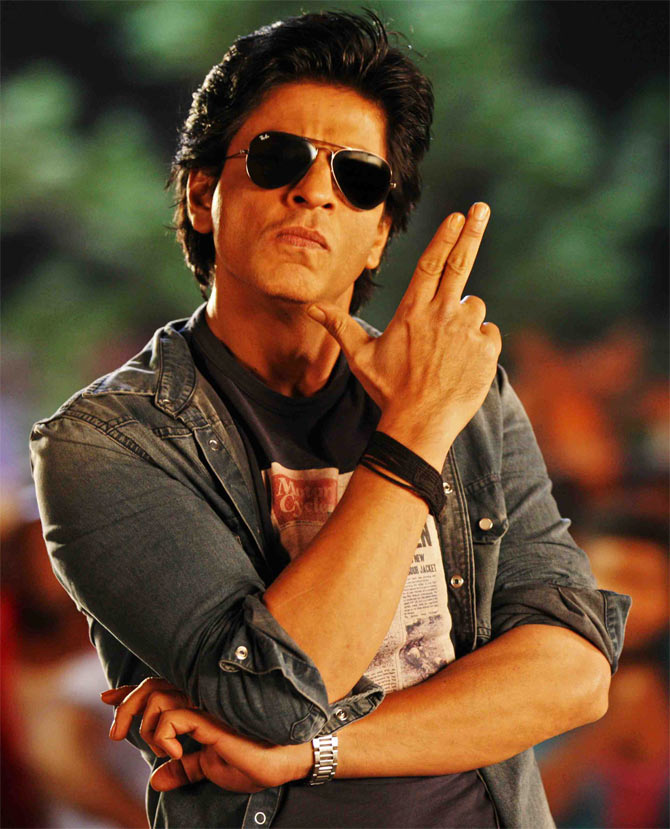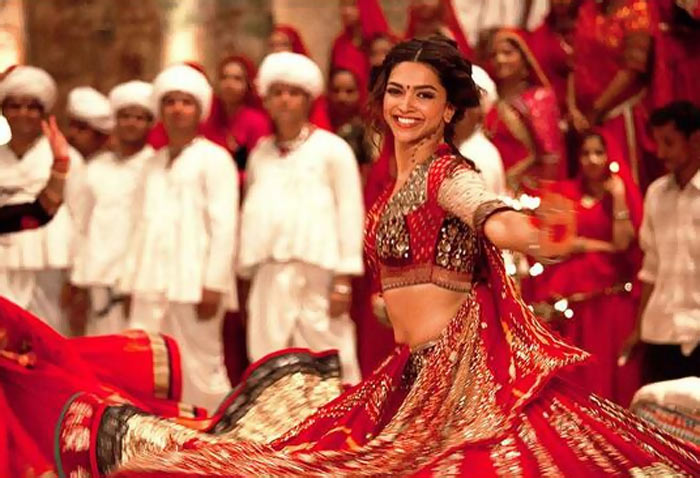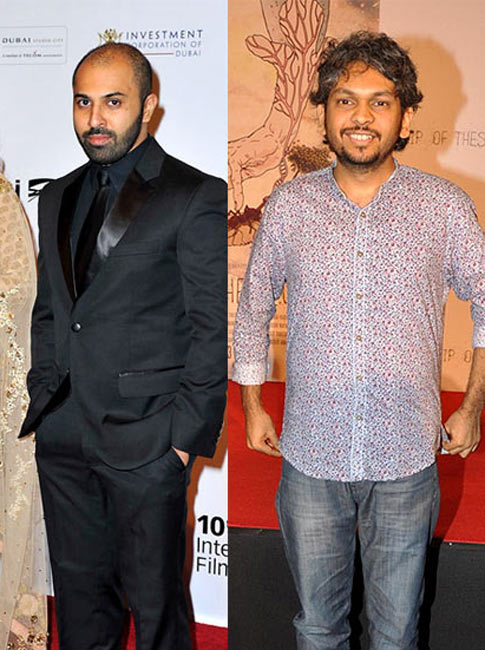Rediff.com's special Year-End series continues... the second part of the biggest Change-Makers in Bollywood in 2013.
Please . And the Rajs and Rahuls have become implanted in their DNA; they believe he is that man.
Everything changed with Dilwale Dulhaniya Le Jaayenge, because the whole value system, the ideology and ethos of that film was that he was a lover who refused to run away with his girl, he wanted to win the parents's blessing. It was the first such film, and in doing it so successfully he touched a million parents's hearts.
And then the eternal lover in Dil Toh Pagal Hai, the young father in Kuch Kuch Hota Hai... It all made him the ideal man to be and he resonated in larger and larger ways with his audience.
There are superheroes with super powers and superheroes with human powers, and he has such human powers. And he really has the love, pure love, from women of a certain age. And by virtue of that the husbands and kids come along.
Over the years I';ve seen people confuse him with his on-screen persona. There are people who bring people to Shah Rukh and say, 'Tell my son to be good to me,' or 'Tell my husband to be good to me.' It is amazing.
Also, he has a certain sadness in his eyes, which brings about a certain protective instinct in women. Plus, when he talks, on stage or in interviews, he just speaks with his heart on his sleeve; it makes people fall in love with him even more.
When he entered Hindi cinema, he was meant to be that theatre-actor who would change the style of the movies. He just fell into the right -- or the wrong -- hands, however you choose to look at it. Cinema ended up changing his stride a little bit. It was surreal.
Aamir walked out of Darr and Shah Rukh walked into it, and their paths changed. Aamir became the super-commercial actor, going on to act with Inder Kumar, etc and Shah Rukh was more experimental, working with Ketan Mehta and Aziz Mirza. If Darr hadn't happened, maybe Aamir would have been in Kuch Kuch Hota Hai and Shah Rukh would have done Lagaan.
I see a silence in his performances now, a quiet in his work.
He is clever enough to go with the world around him; his intelligence makes him adapt. Shah Rukh was always evolved enough to know that if Yash Chopra wanted him to unabashedly stretch his arms out on a hilltop, he'd do it with as much abandon as he'd try to be natural in an Aziz Mirza film or with as much abandon as he'd tackle a Rakesh Roshan reincarnation drama.
I am glad he is doing Maneesh Sharma's next film (Fan) because he seeks out challenges not only as a superstar but also an actor. He doesn't make a big deal about the work he puts into every film, but he does a lot without talking about his method or his process.
Once he told me he has a different walk for every character he plays. "In my head I rehearse that," he said. "If I walk right I'll do the scene right."
Even in a mainstream film like Kabhi Khushi Kabhie Gham, who cared about all that, but he'd made his own character. Like he never smiled in that film. "I'll only smile in the second half when I am with my wife." He'll never tell you, but he has it all worked out.
I wish Shah Rukh could do some movies -- at least one movie a year -- where there is no pressure of it being 'A Shah Rukh Khan Major Motion Picture.'
I wish stars were allowed to experiment on a smaller scale without so many prerequisites. We are still a country too obsessed with stardom, and I wish he was allowed the luxury to do something that motivates him as an actor without other expectations.
Karan Johar has directed Shah Rukh Khan in Kuch Kuch Hota Hai, Kabhi Khushi Kabhie Gham, Kabhi Alvida Na Kehna and My Name Is Khan.
As told to Raja Sen.
Kindly click Next to meet more Bollywood Change-Makers...
Deepika Padukone, Box office Queen
Image: Deepika Padukone in Goliyon Ki Raasleela Ram-LeelaBecause: Deepika Padukone's rise to stardom has been swift and sure-footed since her dream 2007 debut with Shah Rukh Khan in Om Shanti Om.
With back-to-back hits like Race 2, Yeh Jawaani Hai Deewani, Chennai Express and Goliyon Ki Raasleela Ram-Leela 2013, without a doubt, belonged to her.
-- By Sanjay Leela Bhansali
I've worked with some of the most beautiful and talented actresses of contemporary Indian cinema. Be it Manisha Koirala (Khamoshi: The Musical), Aishwarya Rai (Devdas, Guzaarish), Rani Mukerji (Black) or Madhuri Dixit (Devdas). They are extraordinary women with tremendous screen presence.
Working with Deepika Padukone in Goliyon Ki Raasleela Ram Leela was another experience altogether. She is outstanding.
Deepika came in to the project at a late stage. She worked doubly hard to fit into her character. At times the spoken and body language of Leela were beyond Deepika's grasp. She didn't hesitate in walking and dancing that extra mile to get into the skin of her character.
Deepika played a character named after my mother. She had a special way beyond anything anyone can expect from her. I just had to explain what I wanted.
She had never played such an unabashed character. Once in a while Deepika would get taken aback by her character's uninhibited behavior. But she would convey exactly what I wanted.
There is so much innocence in her expression of sexual curiosity. If I said to her that the lovers don't talk anymore but kiss because there is nothing more to be said, she knew exactly why dialogue was no longer required.
She made the expression of love so effortless and magical...
I don't think any other actress could have done what she has done; she has conveyed the purest form of love.
She gave all of herself to the music, became a part of the sound and danced like a dream. There would be laughter, joy and music on the sets all the time.
Of course, there were times when I would suddenly change the steps and Deepika would be thrown completely off-course. I don't like to rehearse too much for my song picturisations.
How brilliantly she adapted to my style. Deepika got blisters and wounds on her feet during the Garba song; still she'd say, "Let us do one more take." When Priyanka Chopra shot her song she said, "Good, we rehearsed for two days because when we shot the song we didn't use a single step from the rehearsals."
Deepika is as gorgeous and disciplined as Aishwarya. She has a very sharp mind. When she talks, she talks sense.
What I really like about Deepika is her no-nonsense attitude towards her work. She doesn't carry any baggage of social obligation to the set.
She is cultured, cordial and warm, but only to the extent that she needs to be as a professional. There is no pretence of making long-lasting friendships on the sets.
She is deeply committed to her work. And that is it.
I think doing Ram Leela liberated her on screen. She learnt how to surrender herself in the dance and emotions. I remember I gave her the film's toughest sequence to perform first. She rose to the occasion.
I would change pages of dialogues at the last moment. She would complain only half-heartedly. And then quickly get down to the task of getting it right.
Deepika has blossomed into one of our finest actresses. It would be interesting for me as a director to see where she goes next.
Sanjay Leela Bhansali directed Deepika Padukone in Goliyon Ki Raasleela Ram Leela.
As told to Subhash K Jha.
Kindly click Next to meet another Bollywood Change-Maker...
Ritesh Batra and Anand Gandhi, Out of the box
Image: Ritesh Batra and Anand GandhiBecause: One's feature length debut triumphed at Cannes as it won the Critics Week Viewers Choice Awards, the other's feature length premiered in 2012 at Toronto Film Festival.
Together, directors Ritesh Batra's The Lunchbox and Anand Gandhi's Ship Of Theseus stole the limelight away from big-budget banners, opened the road to the theatres for star-bereft, content-driven Indian cinema and had global cinema sit up and take notice.
-- By Dev Benegal
Anand and Ritesh have done in two different ways something very unusual and special.
Anand's Ship Of Theseus particularly found an audience in India, and it connected and resonated with so many people here.
It achieved a very special kind of presence in the Indian box office and amongst the young Indian audience.
Anand is very good and talented at the way he was able to leverage social media in increasing the awareness and excitement, and the conversations and discussions around his film.
I met a large cross-section of people who really connected with the film. And it's a film about India, for Indians.
It was exciting to see how a film of that scale and size could actually find an audience. It reminded me a lot of the time when I made English, August and it was acquired by 20th Century Fox and released, which was quite unusual because we didn't have multiplexes at that time.
Fox released the film in 1,000, 1,200-seat single cinemas. We had a Rs 30,000 budget for publicity and there was no social media at that time.
What did help was a very focused campaign on television.
Those were the days that people looked forward to going to see films. In many ways Anand's film reminds me of that feeling and excitement of wanting to go inside the cinema and see the film.
The Lunchbox has still not opened in the US. But Ritesh has achieved something remarkable in that the film has a real buzz amongst the trade and the buyers who are quite excited about it.
There is something very simple and yet approachable to a world audience about the way he tells the story and the way he represents this culture on screen. It will be interesting to see how it plays in the US.
The films for me represent two different dimensions -- one that has squarely worked well with an Indian audience, and the other that has a clear focus of a story out of India that works for a global audience.
The Indian film industry is well structured. It has got a clear and distinct model. It funds itself and has a way it sells its movies. It is a very successful model and I don't think it is going to change in a long time.
Both of these movies worked outside that model. They will continue to do what they will have to do.
I don't think the Indian mainstream game of Bollywood will change or it has to change. But I know that the audiences are looking for something fundamentally new and different and that is not being recognised by the mainstream cinema, because they keep doing their own thing ad infinitum, with a conviction that whatever they are doing is going to work, not realising that there are options and different kinds of movies that could work equally well.
What is really exciting about these two films is that they are just the tip of the iceberg. The number of young, aspiring filmmakers and screenwriters I meet who are dying to make films for an international audience, but trying to tell Indian stories is remarkable.
They are trying to make films outside the stifling Bollywood model of filmmaking.
These two films shine a light on this future and they say -- 'Hey guys, it is possible; you just need to pursue your dreams. You don't have to follow the Salman, Shah Rukh, Aamir cinema model. There is another world and that world may be even more financially successful than this.'
Dev Benegal, the director and screenwriter, is best known for his debut film, the award-winning English, August.
As told to Aseem Chhabra.
Tomorrow: Meet some more Bollywood Change-Makers...




Comment
article